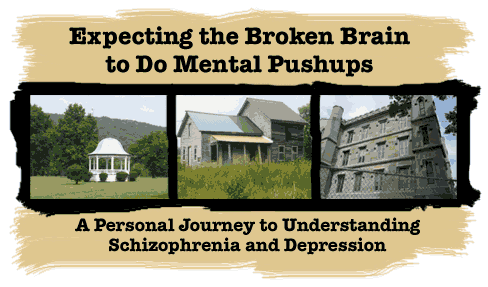
In his 2012 book Expecting the Broken Brain to Do Mental Pushups, Dave Elder takes the reader along on A Personal Journey to Understanding Schizophrenia and Depression. Dave's journey began at the age of three-and-a-half when his mother developed schizophrenia following the birth of his younger brother and finally came full circle in the winter of 2002 at what Dave calls, as the title of Chapter 14 in his 15-chapter book, The Sock Drawer Moment. Having reached a basic understanding of these psychiatric problems, Dave then began to notice how much other people continue to misunderstand them. At a certain point he felt compelled to begin writing the book as a way of sharing what he had learned about schizophrenia and depression, and by extension, bipolar disorder as well. He made this latter connection, at the aforementioned Sock Drawer Moment, from hearing someone in a state of major depression say exactly the same thing he had heard said by someone with bipolar disorder, and in exactly the same way.
Dave does not claim any particular expertise in psychiatry or psychology, and he does not believe he has discovered any great insights that the professionals in the field don't already know. He simply shares his own misunderstandings along his journey, which were many and varied, and the ways in which he arrived at his own clear view of schizophrenia and depression, in the hope that taking others along on his personal journey will help them to better understand as well, especially those who find themselves in the same position as him, as a caregiver for someone with schizophrenia, depression or bipolar disorder. As Dave says, "These people need our help, even though sometimes they may tell us they don't need or want our help, and we can help them better when we understand them better."
In March of 2024 Dave released the second edition of his book, expanding his personal journey to also include wider experience with elements of bipolar disorder. In addition, he tries to shed more light on the brain chemical imbalance explanation. A lot of people question this unproven theory, which science cannot yet verify, but which closely fits the episodes that caregivers for people suffering from psychiatric problems will often observe.